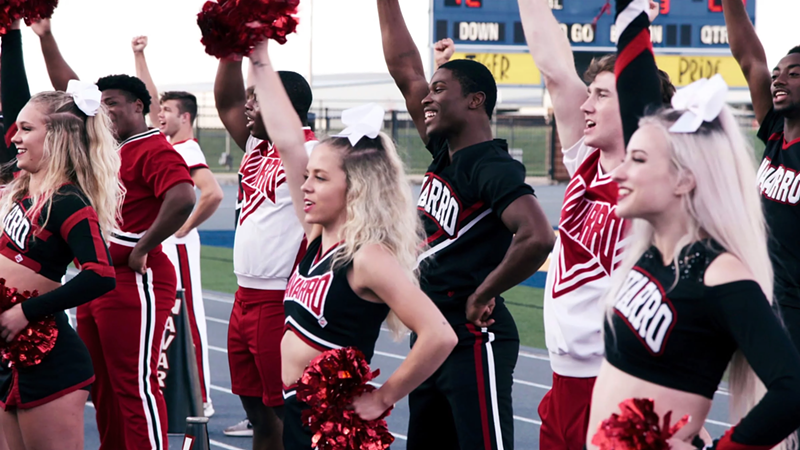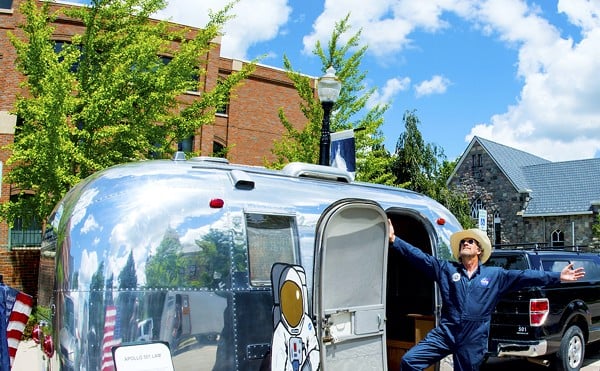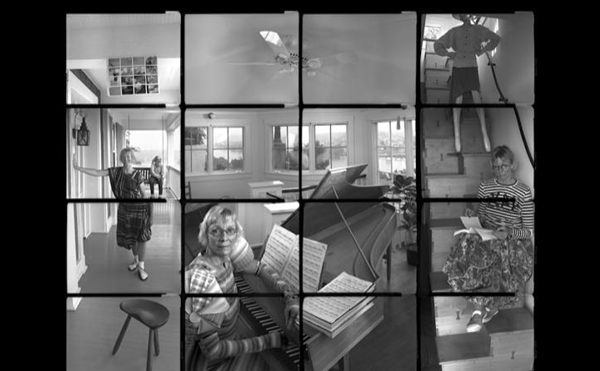At one time, being a documentary buff used to signal a certain mustache-twisting pretentiousness or hip penchant for quirky true storytelling. But now, amid what some are calling a golden age for documentaries, the medium has never been more accessible, abundant or varied. If you have an interest — or, better yet, a topic you know nothing about — there’s a film or series devoted to its every minutia. What’s more, they’re at a higher caliber of quality and content than ever before.
This is all to say you should definitely be watching Cheer, the Netflix docu-series about an elite college cheer team — even if you’re not all about that cheer/dance/gymnast life. If you picture pep rallies and pom poms when you think about cheerleaders, you’ve got a lot more coming. These are talented athletes with compelling personal journeys who ultimately enjoy very little glory compared to their on-field counterparts.
The series follows coach Monica Aldama, who’s molded the cheer program at Navarro College in Corsicana, Texas into a record-breaking gold standard for the sport. Since 2000, she’s led the team to 14 national championships.
My first thought when watching — after being bombarded by the Cheer buzz on social media — is how much it reminded me of Last Chance U, another Netflix sports doc. Turns out, it’s no coincidence. Creator/director Greg Whiteley is the driving force behind both series. Similarities abound: Both feature exceptional teams at unassuming junior colleges in small Southern towns. Both teams draw athletes from across the country, often with complicated pasts. And while Cheer’s “Queen” Monica is nowhere near as bombastic as the football coaches in Last Chance U, she certainly is a big personality.
But it’s the young men and women who make up the Navarro College cheer team that stole my heart and compelled me to blaze through the perfectly digestible six episodes in a single Sunday afternoon.
There’s La’Darius Marshall, who was on track to be a football star, only to find himself more interested in the action on the sidelines. And the utterly loveable Jerry Harris, who has overcome countless challenges to compete, yet is the team’s beacon of positivity. YouTube star Gabi Butler comes with a built-in following from the cheer-related social media content she’s been producing since she was a little kid. Butler has a lot of opportunities and advantages the others just don’t, but she’s not without her own kind of baggage (read: her cringeworthy stage-parents).
Every day, these athletes put their bodies and future at risk for a sport that they love, a coach they respect and a mission to bring home another title at the National Cheerleading Championship. For this widely diverse group — particularly for such a conservative small town — this team is their family.
And the risks are troubling. Take for instance Morgan Simianer. With a heartbreaking background and serious abandonment issues, the pint-sized hopeful is willing to step into the dangerous role of flyer, being repeatedly tossed and (hopefully) caught, replacing another teammate who injured herself in that very position — all to impress her beloved coach.
One by one, others succumb to injuries, too; their dreams of competing at nationals dashed. The leadership’s reaction to these falls and sprains sometimes range from annoyance to indifference, inviting criticism by some. How is this any different from football and other sports? Perhaps some people take these injuries a little more seriously when the athletes don’t look like little girls. And with cheerleading, there is especially little long-term payoff or career prospects. There’s no way to earn a multimillion-dollar contract like the players who make it in the NFL. You might think at least they don’t have the issue of severe head injuries in cheer, that is until you watch a teen list how many concussions she’s had on the mat. The series doesn’t shy away from the controversy — the focus is definitely on the team’s path to defend their title no matter what, and Cheer exposes many of those costs.
Good documentaries can make any subject fascinating and relatable, so I’m not sure why it’s so surprising to some viewers that a series about cheerleading is so captivating. Audiences are craving authentic storytelling, and Cheer gives these incredible athletes a platform to be real and raw — and gets you rooting for them.
Contact Jac Kern: @jackern






